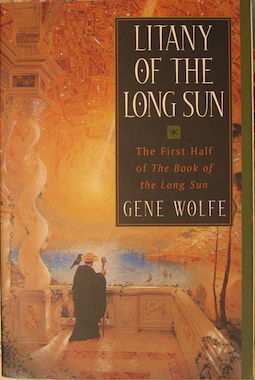books
Books like Epiphany of the Long Sun
Epiphany of the Long Sun
3.5 starsWell, I definitely enjoyed the Long Sun series much more this time around and was surprised to find that I didn’t even mind _Calde of the Long Sun_ which was the point at which I abandoned ship on my previous re-read attempt of the series. I was probably most surpised by the number of times that things I thought of as opaque mysteries in the series were actually either pretty clearly telegraphed or even explicitly stated in the text (albeit perhaps in passing) which led me to two obvious conclusions about Gene Wolfe: it pays to re-read his work if you hope to get anything substantial out of it, and if you don’t read the text closely (with particular emphasis to recalling what has come before) then you will miss a lot. Of course I must also acknowledge that many of these ‘mysteries’ were no longer mysteries to me from external reading I’ve done so I can’t say that it was simply the result of my closer (re)reading of the text. Nonetheless I was startled at the number of things that weren’t as obscure as I used to think when I heard about all of the Gene Wolfe theories for this book out there. That’s not to say that I think the text is in any way straightforward, but I’m starting to appreciate that Wolfe isn’t as sadistic in regards to the reader (specifically in his creation of story-puzzles) as I had previously thought (he’s still a little bit sadistic of course). My next surprise was that I didn’t hate Patera Silk nearly as much this time around. I think the character Hyacinth sums up my main issues with Silk as follows: “He’s forever blaming himself for the wrong things.” Well, he still does, and while Silk still comes across as something of a well-meaning naif stumbling through his adventures, not to mention someone who is perhaps a little too good to be true (though there is significant in-story justification for this as we will see) he definitely displays layers that went beyond his moralizing and over indulgent self-doubt and, while perhaps not my favourite character in the books, he didn’t drive me away screaming either. Kind of faint praise so far, huh? Well I’d say I’m still torn on this series. On the one hand it’s got a lot of awesome stuff going on, to quote myself: “a generation starship story with digitized people turned into gods, robotic armies, political revolution, bodysnatching psychotic teenage clones, and vampiric, shapeshifting aliens.” On the other hand I’d still say that while some of these elements might not be as invisible as I had previously felt, they’re not always front and centre either and, quite frankly, Wolfe really makes you work for it. There’s nothing wrong with that per se, literature doesn’t have to be (maybe *shouldn’t* be) easy, but I’m often chagrined by Wolfe’s penchant for hiding all of the ‘cool stuff’. Conversely (and perversely) I actually seem to be starting to enjoy it…have I finally fully imbibed the Wolfe kool-aid? Well, not totally perhaps. I think in the end I’d have to say that I ‘appreciate’ this book more than I ‘like’ it. There’s lot of elements in it that I *do* like, but so many of them are sub-text, or implied elements that only seem apparent (to me at least) upon multiple readings, that I can wholly sympathize with the first time reader that comes away from this scratching his or her head (as I did). As the story continues from where we last left our hero, Patera Silk has now become Caldé of Viron (at least in name) and is directly opposed by the Ayuntamiento (the group of councilors that previously led the city and is entirely populated by (view spoiler)[immortal cyborg politicians *shudder* (hide spoiler)]

Filter by:
Cross-category suggestions
Filter by:
Filter by:
Filter by:
Filter by:
Filter by:
Filter by:
Filter by:
Filter by: